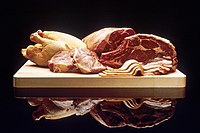
Photo from wikipedia
Abstract Food products with ethical claims are stacked on supermarket shelves in ever increasing numbers, but their share of total food sales does not usually climb above a one-digit figure.… Click to show full abstract
Abstract Food products with ethical claims are stacked on supermarket shelves in ever increasing numbers, but their share of total food sales does not usually climb above a one-digit figure. Numerous consumer studies have investigated the motives of consumers to purchase food items with ethical claims, as well as the potential purchase barriers. The presented study merges these insights with the concept of the warm glow of giving, which originates from public good theory, as we enlist food items with ethical claims as private goods with public good characteristics. The warm glow of giving reflects personal gain from an act of altruism. How the warm glow influences the intention to purchase food items with ethical claims, and the actual food choice, is the core question of this paper. Going into more depth, prosocial (fair-trade) and pro-environmental (organic and carbon-neutral) claims are explored separately, and cross-cultural differences are pointed out. The empirical analysis is based on a representative consumer survey in the U.K. (n = 452) and Germany (n = 465) which incorporated a choice-based conjoint analysis. Both are mature markets for food items with ethical claims, yet with varying degrees of market penetration for prosocial and pro-environmental claims. Our results suggest a higher level of warm glow in the German sample, leading to a generally larger influence of the warm glow on the evaluation of ethical claims as compared to the U.K. Overall, the fair-trade claim is affected more positively by the warm glow than the pro-environmental claims, which can be explained by its stronger public good characteristic as compared to the organic claim and its perceived health benefits. Additionally, label awareness is a necessary precondition for any warm glow effect as the results of the carbon-neutral claim show. These findings are indicative for the use of the warm glow for marketing and social marketing strategies in order to increase the sales of food products with public good characteristics.
Journal Title: Journal of Cleaner Production
Year Published: 2019
Link to full text (if available)
Share on Social Media: Sign Up to like & get
recommendations!